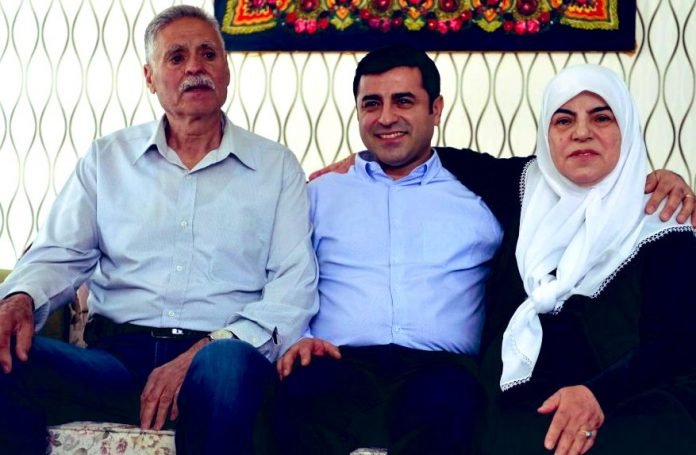Kurdish leader Selahattin Demirtaş, a two-time presidential candidate and former co-chair of the pro-Kurdish Peoples’ Democratic Party (HDP) who has been imprisoned since 2016, did not attend his father’s funeral on Sunday in protest of his imprisonment, Turkish Minute reported.
Demirtaş’s father, Tahir Demirtaş, passed away on Sunday morning at the age of 78 at his home in Turkey’s southeastern Diyarbakır province. Demirtaş had said he would not request to attend the funeral as an act of protest against his continued imprisonment. His decision was announced by his lawyers.
The former HDP co-chairman’s lawyer, Ramazan Demir, shared a farewell letter from Demirtaş to his father on social media. In the handwritten note Demirtaş wrote: “Don’t worry father, our hearts are bigger than this cell. I ask for your forgiveness. I kiss your calloused worker’s hands a thousand times. May your place be in heaven.”
After his father suffered a heart attack in November 2022, Demirtaş, who was imprisoned in Turkey’s western Edirne province, was transported to Diyarbakır under strict security to briefly visit his father in intensive care before being returned to Edirne.
The HDP’s successor party, the pro-Kurdish Peoples’ Equality and Democracy Party (DEM Party), released a statement on the death of Tahir Demirtaş in which they referred to his son as a “hostage.”
“Our deepest condolences go to dear Selahattin Demirtaş, the Demirtaş family, our party members and our people. May Tahir Demirtaş, who spent his life struggling and raising his sons, be in heaven. Those who inflict this pain on people who engage in democratic politics, those who prevent them from being with their loved ones in their last moments, will drown in the anger they create,” the DEM Party said.
Various political figures also extended their condolences to Demirtaş. Among them were main opposition Republican People’s Party (CHP) leader Özgür Özel, the leader of the Workers’ Party of Turkey (TİP) Erkan Baş and former CHP leader Kemal Kılıçdaroğlu, who all conveyed their condolences through social media.
Demirtaş, the most prominent Kurdish politician in Turkey today, has been behind bars since November 2016 on politically motivated charges. He was a vocal critic of the Justice and Development Party (AKP) and its leader, President Recep Tayyip Erdoğan, and challenged Erdoğan in the presidential elections of 2014 and 2018.
Demirtaş previously listed in a series of tweets four court decisions for his release that were handed down by the European Court of Human Rights (ECtHR) in 2018, the Ankara 19th High Criminal Court in 2019, the Constitutional Court in 2020 and the Grand Chamber of the ECtHR in 2021, saying President Erdoğan prevented compliance with those decisions.
During his incarceration, Demirtaş has continued to exert influence over Turkish politics. He ran his campaign for the 2018 presidential election from jail. Through his lawyers, he also actively supported the election campaign of the HDP — which ran under the Green Left Party (YSP) due to the threat of closure by the top court — and the opposition presidential candidate Kılıçdaroğlu for the May election on social media.
Thousands visited the house set up in Diyarbakır for those wishing to pay their respects to the grieving family.
Lawmakers, politicians, representatives of various civil society organizations and residents of the region flocked to the house to offer their condolences.
Despite the personal loss, Demirtaş continued to defend himself at Tuesday’s hearing in the “Kobanê trial,” which has led to the imprisonment of dozens of Kurdish politicians for allegedly instigating a series of protests in the predominantly Kurdish southeastern provinces in 2014 in reaction to clashes between Syrian Kurds and the Islamic State in Iraq and the Levant (ISIL).
The deadly 2014 protests erupted as ISIL militants laid siege to the predominantly Kurdish Syrian town of Kobanê. Thirty-seven people died in demonstrations against the Turkish army’s inaction in the face of the ISIL offensive.
In Tuesday’s hearing, Demirtaş dedicated his defense to his deceased father, saying, “I dedicate my defense to my father, the craftsman Tahir, and in his person to all hard-working mothers and fathers.”
During the hearing, Demirtaş focused on a defense aimed at deconstructing the accusations against him.
“Your Honor, if you ask us why we are on trial, let me explain it to you this way: Our people want to feed themselves, to have children, to survive. That’s what the Turks wanted when they came to this land. From a biological point of view, everyone is in the right, but not everyone is strong. Biologically, only the strong survive. We have created culture, law and morals to prevent this. Culturally, we [Kurds] are in the right. We are on trial for defending ourselves against a tyrannical culture,” Demirtaş said in his defense.
Kurds make up around 20 percent of Turkey’s population. The group has faced a long history of discrimination and violence in the country. They are often pressured not to speak their native language. Authorities frequently claim that people speaking in Kurdish are actually chanting slogans in support of the outlawed Kurdistan Workers’ Party (PKK), which has been leading an armed insurgency against Turkey’s security forces since 1984 in a campaign that has claimed the lives of some 40,000 people.















